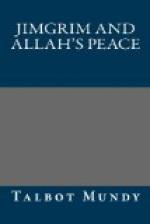“Had enough?”
“No.”
“Got the hang of it?”
“Yes, I think so,” I answered. “Allah’s peace, as they call it, depends on the French. They intend to get Damascus and all Syria. So they sent down Abdul Ali of Damascus to make trouble for the British in Palestine; the idea being to force the British to make common cause with them. That would mean total defeat for the Arabs; and Great Britain would save France scads of men and money. But you pulled that plug. I saw you do it. I heard Abdul Ali of Damascus tell you Scharnhoff’s name. Did you go after Scharnhoff?”
“No, not yet,” he answered. “You’re no diplomat.”
I knew that. I have never wished to be one, never having met a professional one who did not, so to speak, play poker with a cold deck and at least five aces. The more frankly they seem to be telling the truth, the more sure you may be they are lying.
“Neither are you,” I answered. “You’re a sportsman. Are you allowing Scharnhoff weight for age, and a fair start—or what?”
He chuckled. “You believed old Abdul-Ali of Damascus? He’s a French secret political agent. So whatever he told us is certainly not true. Or, if it is true, or partially true, then it’s the kind of truth that is deadlier deceptive than a good clean God-damned lie. Get this: such men as Abdul Ali would face torture rather than betray an associate—unless they’re sure the associate is a traitor or about to become one. A government can’t easily punish its own spies on foreign territory. But by betraying them, it can sometimes get the other government to do it. That Abdul Ali betrayed Scharnhoff to me, proves one of two things. Abdul Ali was lying, and Scharnhoff harmless—or in some way Scharnhoff has fallen foul of his French paymasters and they want him punished. Very likely he has drawn French money, for their purposes, and has misused it for his own ends. Or perhaps they have promised him money, and wish to back down. Possibly he knows too much about their agents, and they want him silenced. They propose to have us silence him. I’m going to call on Scharnhoff.”
“You suspect him of double treachery?”
“I suspect him of being a one-track-minded, damned old visionary.”
I had met Hugo Scharnhoff. Long before the War he had been a professor of orientology at Vienna University. At the moment he was technically an “enemy alien.” But he had lived so many years in Jerusalem, and was reputed so studious and harmless, that the British let him stay there after Allenby captured the city. A man of moderate private means, he owned a stone house in the German Colony with its back to the Valley of Hinnom.
“Care to come?” Grim asked me.
“Yes.”
“Know your Bible?” He proceeded to quote from it: “And the rest of the acts of Ahaziah which he did are they not written in the book of the chronicles of the Kings of Israel?"’




